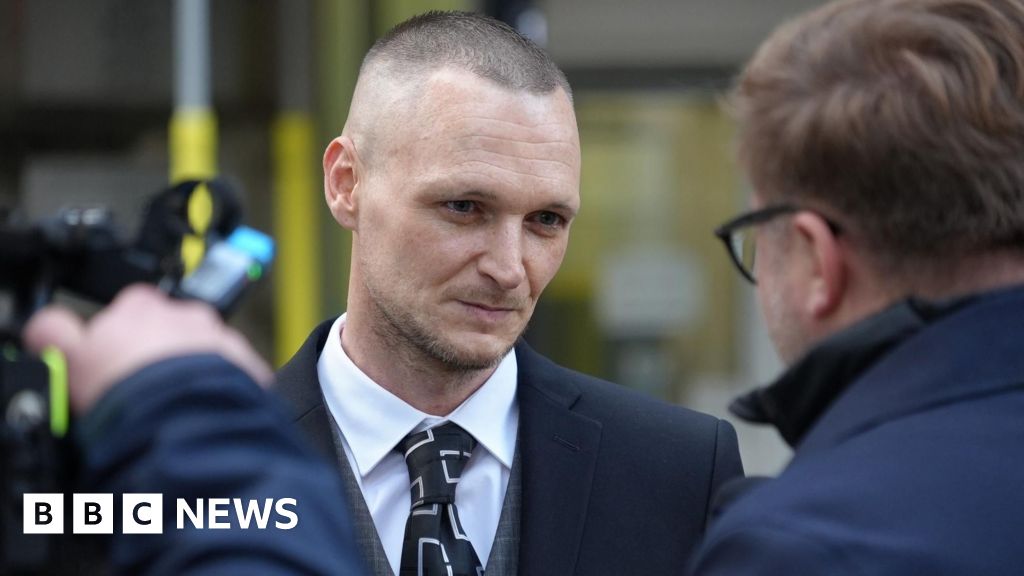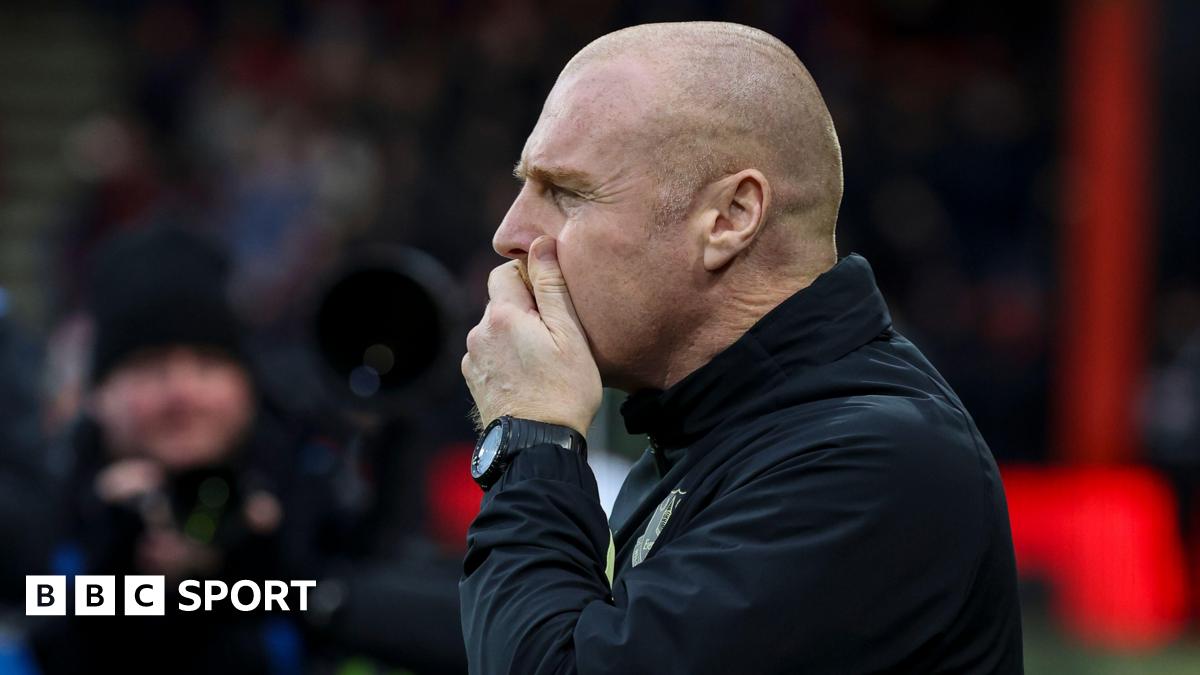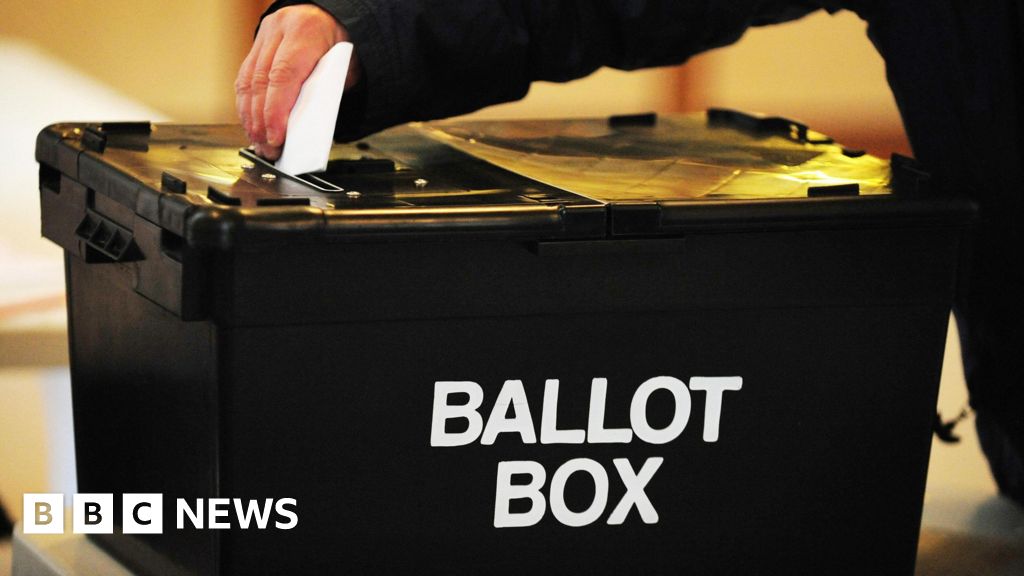
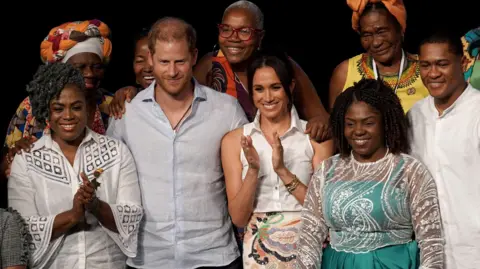 Reuters
Reuters
Prince Harry and Meghan (centre) were invited to Colombia by Vice-President Francia Marquez (right)
Prince Harry and Meghan may no longer be working royals.
But on their tour to Colombia, they still received a stately welcome.
They were there on the invitation of the country’s Vice-President, Francia Marquez.
That also meant they received a heavy government-backed security operation throughout their trip.
They no longer get this in the UK, something they have argued to the UK government and Royal Family that they should, especially given they have been targeted by threats and abuse in the past.
It was their second overseas visit in just a few months, having travelled to Nigeria earlier this year.
So, what was it for?
Primarily, they say this was about promoting their charity work trying to make the internet safer for children.
They spent the first two days talking to activists, experts and school children about the impact of social media on young people and took part in a summit on internet safety.
At the event, Prince Harry criticised the impact of AI and false news on the internet, saying: “We are no longer debating facts.”
He added: “For as long as people are allowed to spread lies, abuse, harass - then social cohesion as we know it has completely broken down. Ten years ago we could say what happens online stays online, now what happens online within a matter of minutes transfers to the streets.”
Meghan also said that while the internet could be a “connective and harmonious” space, it had created a culture where people could be very “cruel.”

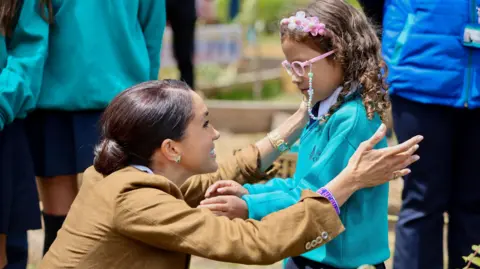 Reuters
Reuters
Meghan and Harry visited a Santa Fe public school during their visit
Part of the visit was also to learn about Colombia’s culture and history.
Ms Marquez is the first black woman to be vice-president of the country and explained that she had first invited Meghan for an International Day of Afro-Descendent Women last year which she could not attend - so this trip was then planned instead.
The couple joined her at events including watching an Indigenous dance performance, visiting a percussion school, and attending an Afro-Colombian festival.
They also met the country’s Invictus Games team - the competition for current and former injured or sick service people that Prince Harry founded.
Events involving members of the Royal Family don’t draw quite the same crowds in South America as they may in other parts of the world.
There were modest groups of people at some events who stopped to try to catch a glimpse of the couple.
One Venezuelan tourist in Bogotá, Jacqueline Romero, told me: “I saw them close; I thought my heart was going to come out. Since I was a child, my grandmother educated me about royalty. I never imagined I would find them visiting Bogotá like me.”
At another event at a percussion school on the beach, though, most of the people enjoying the sunshine seemed unfazed - despite the heavy armed military presence and gaggle of journalists.
That may be, in part, because much of this tour - including the events - were very private and controlled. These strict controls are often very typical of all royal tours too.
The couple and government only allowed their own videographers and photographers into most of the events which they say was to make sure events were represented “accurately.”
Footage was released daily, with no sound.
They took with them only one “pool” reporter from Harper’s Bazaar who released daily updates to the media about what they were doing, copying in their spokespeople and publicity team.
The BBC chose not to rely on this material alone, as we could not be present to verify what was said and described, but we were able to attend the summit and watch some events from the side-lines.
At their visit to a village with strong African connections, San Basilio de Palanque, a square was cordoned off where some stalls and a stage with music had been set up for them to visit. Some locals from their visit were allowed to come in, but many watched bemused from their houses nearby.
Prince Harry and Meghan have been explicit about their concerns about press intrusion on their lives, particularly from British tabloids.
They have received threats online and had many legal battles with newspapers about invasions of privacy.
But as a result, some royal watchers did raise questions like: why do such a high-profile visit which seems, in part, about publicity too for both the hosts and the guests?
For Prince Harry and Meghan, this was about promoting their campaigns to make the internet safer, and some of their initiatives like a new parent’s network to support parents of children who had suffered harm online.
It is also about maintaining their influence and visibility on the world stage, and showing they can still attract audiences with global leaders.

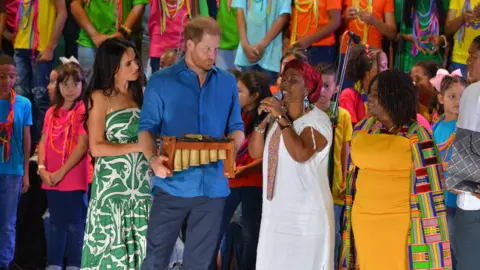 EPA
EPA
The couple onstage receiving an award from Vice-President Marquez and singer singer Nidia Gongora during a music festival
For the government here, it was clear the Vice President hopes their charitable foundation - Archewell - may consider supporting some of the social projects they visited.
It is also good publicity for Ms Marquez ahead of elections next year. Some speculate she may run for president, with the current president Gustavo Petro suffering from poor approval ratings.
While there was certainly a big buzz in local media about the visit, there was some criticism too about the cost of the heavy security presence accompanying them.
Crowds of armed military lined the streets in vast numbers, in part because Ms Marquez herself has had threats on her life.
The Sussexes have said they fear doing similarly high-profile events back in the UK after suffering violent threats online and because they no longer receive the government-funded security they did as working royals.
They have asked the Royal Family and UK government if this could change.
This second international tour in just a few months, though, suggests perhaps international campaigning is where their focus may now turn instead.
The invitation from government figures like Ms Marquez, who come with their own security operation, suggests a future model for how the couple could work safely and on their own terms outside the royal structure.
 (1).png)
 4 months ago
10
4 months ago
10
